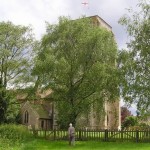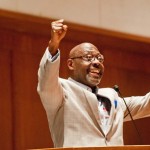You might remember from the recent Religion News Service article, that one of the people interviewed was sociologist of religion Scott Thumma, who said:
Scott Thumma, a sociologist of religion at Hartford Seminary in Hartford, Conn., says the slow church movement makes for good theology. But it likely won’t work for most churches, he said, for the same reason that the slow food movement failed to gain mass appeal.“We’d all like to have a slow-cooked, three-hour meal, with locally grown produce,” he said. “But few of us have the time or money for it.”Likewise, few people would be drawn to the ideas of slow church. All the pressures of modern society, he said, would be against them.“This would likely appeal to an educated, younger hip group of people,” he said. “There aren’t many of them in small churches.”
Our last post by Brent Bill, responded to the claim that Slow Church would primarily appeal to a “younger hip group of people.”
After that post, I had a chance to have a follow-up conversation with Scott, and he graciously agreed to allow it to be posted here:
After having been quoted by the press for 20+ years, I’m well aware that you can never control exactly which comments the reporter (or his/her editor) will use or how specific phrases will sound when they are taken out of the larger context of your conversation with the journalist. I told the reporter I hadn’t seen a copy of your forthcoming book but I’d read and watched some of the material describing your ideas and I’m in considerable agreement with them personally. [I also told him I knew the Slow Food movement and really appreciated its motivation and some of its restaurants too.] I am in complete agreement that the Mainline Protestant world desperately needs to increase the number of strong progressive locally-oriented missional churches that proclaim a serious message of discipleship and faith as a daily-lived lifestyle. How this would be accomplished in each congregation must be tailored to the distinctive context of individual congregations rather than mass produced and applied like a one size fits all franchise model. I hope I am correct in understanding that is what the Slow Church idea is all about. If I’ve read the idea correctly, as I said to the reporter, then it is both excellent theological reasoning and a much needed corrective to our contemporary cultural reality. If I haven’t gotten your idea right, please correct my misperceptions.
At the same time, as a sociologist of religion and someone who has studied American society, congregational growth and decline, and congregations of all sizes and not just megachurches for several decades, it is my professional assessment that the idea will only ever fit or resonate with a very small minority of US churches and Christians. It is a boutique and niche, with distinctively sub-cultural group appeal, model of congregational life. This isn’t meant to be a negative critique of the idea, as I said I think your ideas have great merit. Sociologically, I think those most likely drawn to this idea – and then also be able to put it into practice successfully in community – are much more likely to be younger (under 45), urban, singles and couples without children, educated and relatively affluent. With this general description I’m not describing your specific congregation or the rotund 50yr+ respondents (who probably accurately bear a striking resemblance to me) to your Patheos post, and indeed I’d have the same assessment of the “emergent church” movement as well as other niche efforts in fashion currently.
I do also appreciate that my friend Brent (who is quite hip [“hip” comes in many shapes and sizes] writing very trendy deeply spiritual books) came to the defense of your idea – because as I said, it is a good one albeit one with a limited appeal. While I agree with much of what he said, I don’t agree with Brent’s comment that there are scores of young folks in progressive small churches – at least not according to our Institute’s (which I am a key participant in) four national surveys of congregations called Faith Communities Today. Indeed, I pray we will find ways to reach masses of young people with a meaningful, progressive and contemporary faith before the mainline collapses entirely. I’m sure, as you will see below, my perspective is indeed colored by my personal research on megachurches, but my assessment of the slow church idea is more deeply rooted in the overwhelming trajectory of American cultural norms and the social-psychological evaluation of who might be attracted to such an idea and be able to embody it in a viable congregation.
Personally, I see why you call it Slow Church, but I think the Slow Food movement implications are detrimental to your efforts. The Slow Food trend is a luxury experience and borders on elitism as I’ve experienced it. I know you don’t want this perception to color the acceptance of your well-reasoned and theologically solid argument…. But slow food only works for those with time and resources since any such meal is always more costly in many ways.
All these niche, boutique efforts to revitalize America’s progressive, theologically middle-of-the-road to left, mainline churches by making them more appealing to the generations under 45 might work for a small segment of the overall market, but not enough to reverse the significant downward trend. I am convinced, and it is perfectly fine if you disagree, that what is needed is both a flourishing of these niche efforts to resonate with selective cultural subgroups in our population as well as an effort to create a viable contemporary, progressive vision of church that could resonate with mass market younger adults with kids who populate suburban rings of cities, who shop at Kmart and Target, eat at fast food restaurants and have tired of a “traditional” model of church that sings 200 year old hymns and only asks us to be Sunday Christians. Contrary to what you might think, many megachurches I’ve studied over the years are full of faithful, passionate Christians growing in the knowledge of God and excitedly serving their local community and their neighbors as they express their faith every day of the week in their daily lives. There is good no reason why there are so few progressive Mainline examples of this mass appeal faith expression. Mainline and liberal clergy have surrendered this organizational model to the Evangelical world out of their own hubris and cultural bias. As such, the majority of churched Americans attend Evangelical congregations and increasingly in churches with 350 attenders or more. Sure mass gatherings can engender anonymity and superficial spectatorship and quality faith communities create intentional efforts to overcome this. However, mass religious gatherings also generate a powerful collective energy that empowers people to action and engenders a hopeful vision of social and personal change…. In our highly fractured society of identity groups and market segments, we need a wide variety of styles of progressive congregations who must also preach a meaningful, serious Christianity but we also have to create mass-appeal theologically liberal churches if we hope to offer a progressive picture of Jesus and of faith to more than a faithful, and rapidly aging remnant.
— Scott Thumma












